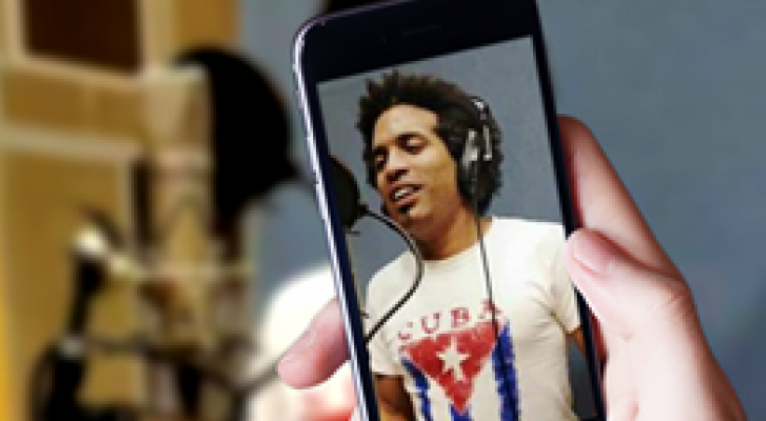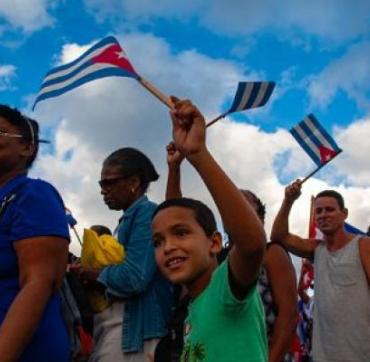Carlos Paz, Endemic Like the Best Ajiaco
especiales

Carlos Paz reached music as he reached the world, at the same time. As his mother tells him, from a very young age, the rhythm, the music got to him: “he couldn't listen to the Radio, she says that as soon as a song was playing, he started to dance, or move part of the body. In Manaca Iznaga, Trinidad, where I grew up, I think that it was there where I understood that music was my thing.
"As a result of a strong influence of the movement of amateur artists that surrounded me I was able to witness several popular parties by amateur groups, self-taught musicians, without academic training, but with a courage and willingness that made you dance and listen to music all night long. It’s typical of my area, the revelries, the tonada music, the free point, the traditional Cuban Son music and the poetic controversy that develops between two or more people spontaneously, is something incredible. It was the fastest way to channel my feelings, my inner world, or to express myself, since it was so much fun for me since then to create and reproduce rhythms ".
At age of ten he began to study percussion at Olga Alonso Vocational Art School and later entered the Art Instructors School: “it was there that I was driven by the guitar and songwriting, although I must confess the guitar had caught my attention earlier”, Carlos says and confesses: “The street school has been my greatest and best academy. Being able to learn, improve myself, grow and connect with people through my guitar, my lyrics, and my voice, has been a challenge and my great test of achievement.”
This young creator identifies many and very diverse references for his work: I like almost every Cuban music, it’s very rich in rhythms and lyrics. Among my references appear: Sindo Garay, Matamoros, El Guayabero, Benny Moré, Ernesto Lecuona, Bola De Nieve, Orquesta Aragón, Los Van, Issac Delgado, Frank Delgado, Gerardo Alfonso, Carlos Varela, Interactivo, Leonardo Garcia, Dúo Cofradía , Alain Pérez, Gema and Pavel, Habana Abierta. As for the non-Cuban musicians Juan Luis Guerra, Joaquín Sabina, Pedro Guerra, Fito Páez, Camarón de la Isla, Concha Buika, Esperanza Spalding, Diana Krall, Ray Charles, Stevie Wonder, Michael Jackson, Djavan, Sting, Cesaria Évora, Salif Keita, Richard Bona, Robben Ford, Jimi Hendrix.
But that melting pot, that ajiaco, to put it in Cuban terms, has led him to his own path: “I think what defines me as a singer-songwriter is the openness of my songs. I always try to be me, to give my views, to give a clear message, but through my feelings, my knowledge, through the ethnic group and cultural background that shaped me as a person and as a creator. As I am a social being of today, I try to recreate from music from my eye, what happens around me.”
This is how Endemic is taking shape, with that spontaneity and also from that multiplicity of views: “it’s my declaration of the musical and social diversity that feeds me since I was a child. I constantly nurture from the Cuban traditional music and I think that the endemism of this album comes from the roots of my influences towards Cuban music. In the album you can find genres like Cuban Son music, Bolero, Rumba but which are reinforced and made complex when mixed with rock and roll, gospel, rap or guaguanco music, with themes from my reality, which is that of many young people of my generation. Traditional music and trova music survive as a nourishing source in me, but I don’t not stop listening, studying and learning from other foreign genres like blues, funk and country.
"The ten songs have nothing in common to put it in a way. I was able to capture and speak about my points of view as a social being, my loves, my frustrations, my constant concern about the emigration of generations of Cubans, the melancholy, faith in tomorrow, history. These songs are sisters but each has its own voice. It was one of the objectives of the production; we did not want to condemn an entire album to a specific sound, when each one is one story, one world, one universe independent of the other."
Endemic is released under the EGREM label and Carlos Paz is the author of most of the songs, except the one that gives name to the album, where he shares the composition with Wilfredo Pomares and another named «Encuentros», musicalized from a text by Carilda Oliver Labra. The production, arrangements, and musical direction were in charge of maestro Justo Rafael Aboy Gonzales: “Whoever dressed, colored, and embellished with his talent these 10 songs I gave him on guitar and vocals. We built a job from the table that allowed us to come to fruition, thanks to the communication, patience, and love poured in the project”.
“As for me, another of the blessings the album gives is the sample of friendship, collaboration, and presence of several of the most prestigious Cuban instrumentalists who make Endemic an album with a description of origin. The list of participants includes: Gastón Joya (double bass), Ruly Herrera (drums), Oliver Valdés (drums), Lino Lores (tres guitar), Nam Sang Fong (electric and acoustic guitars), Andy Rubal (piano and keyboards), Eduardo Ramos (timpani), Eduardo Sandoval (trombone), Alejandro Martínez (cello), William Roblejo (violin), Emir Santa Cruz and Jamil Schery (saxophones), Alejandro González and Tonatiut Isidrón (trumpets), Josué Borges (flute), among many others. In addition to the aforementioned artists, also participate as guests: Alain Pérez in the song "Canciones ", David Torrens in "Arena y mar", Etian Brebaje Man in "Endemico", the Los Embajadores trio in "Te espero" and Sady Cruz as a solo voice in «Amame». The musical production of Justo Rafael Aboy (who, in addition, does the electric bass in all songs). The choirs were performed by Florana Padilla, Yara Castle, and Ariel Roig (the last two, responsible for the delightful gospel voices on "Filosofia de Juan"); the recording of Marvin Mustelier; the mixing and mastering of the pair Daelsis Pena and José Raúl Varona; in photography participated friends like Iván Soka, Iván Botello, Alejandro Askuy, Alexei Hernández and Víctor Manuel Echenagusía; and the design of Emilio García and Leidy Conde”.
A superb cast of instrumentalists and guests gathered by Carlos Paz's: “It has been a beautiful and strong experience for me, in every way. I had the chance to meet many of whom I admire as much as artists. Working with professionals will always be a blessing, and a motivation to do it better. Under the talent and humility of teachers like David Torrens, Alain Pérez, Gastón Joya, Oliver Valdés, and others, it will undoubtedly be an experience to keep on learning all the time.”
In 2016, the album won the Ignacio Villa Creation Scholarship, “one of many opportunities offered by Hermanos Saíz Association free of charge for young artists in Cuba. One of the benefits that includes winning the award is to record a disc at Egrem Editions and Recordings Company. I have to thank this institution that has supported me at this important moment in my career, who opened the door of its studio and is currently helping me with the national and international promotion of the album. There are people who supported me and still do it like Mario Ángel Escalona Serrano, Gretel Garlobo, Yamilet Pro León, Natalie Méndez and Yamile Castro”.
Satisfied? “Although I have this feeling that I could have done better, I’m satisfied with the end product. It’s my first album, and I hope it’s not the last one. The public is reacting with great affection and acceptance, they always have the last saying, the truth. It was a team work, with dedication, love and discipline and Endemic is the result of all that effort. We are already working on the video, hopefully before the end of 2020 we can have our first video clip. "
Translated by Amilkal Labañino / CubaSí Translation Staff














Add new comment